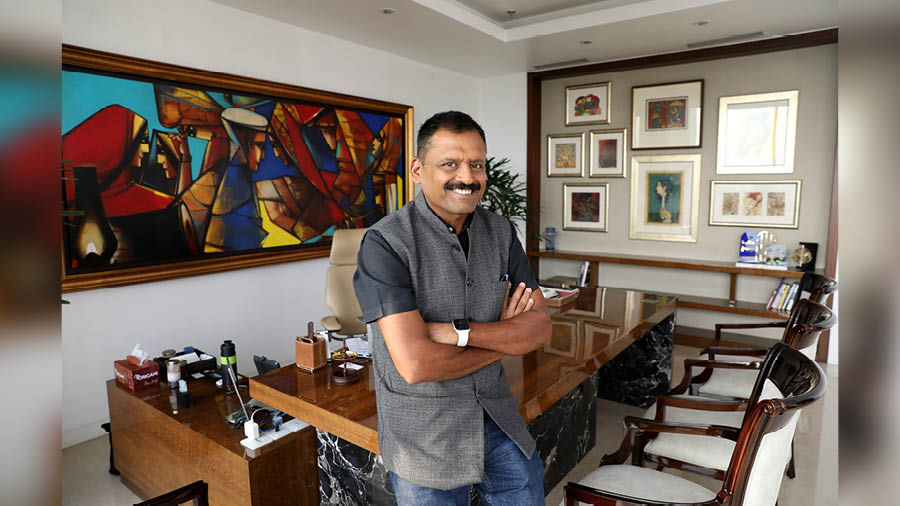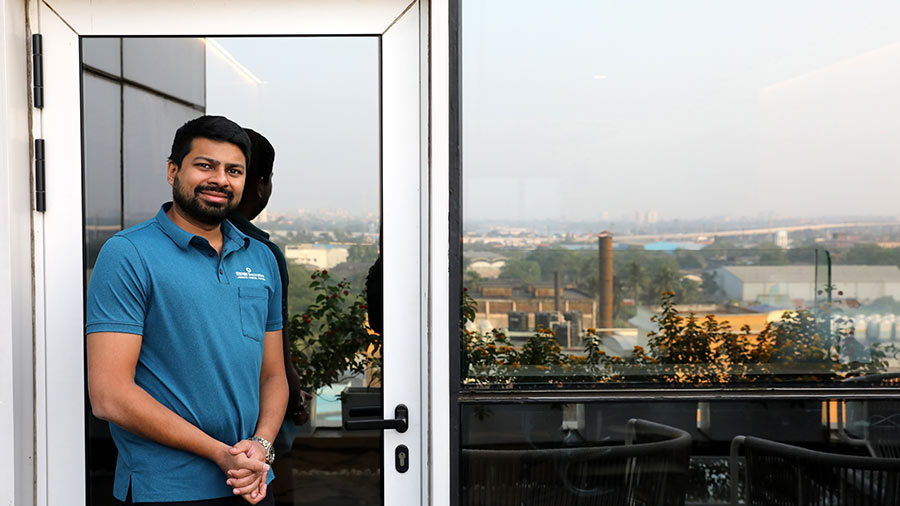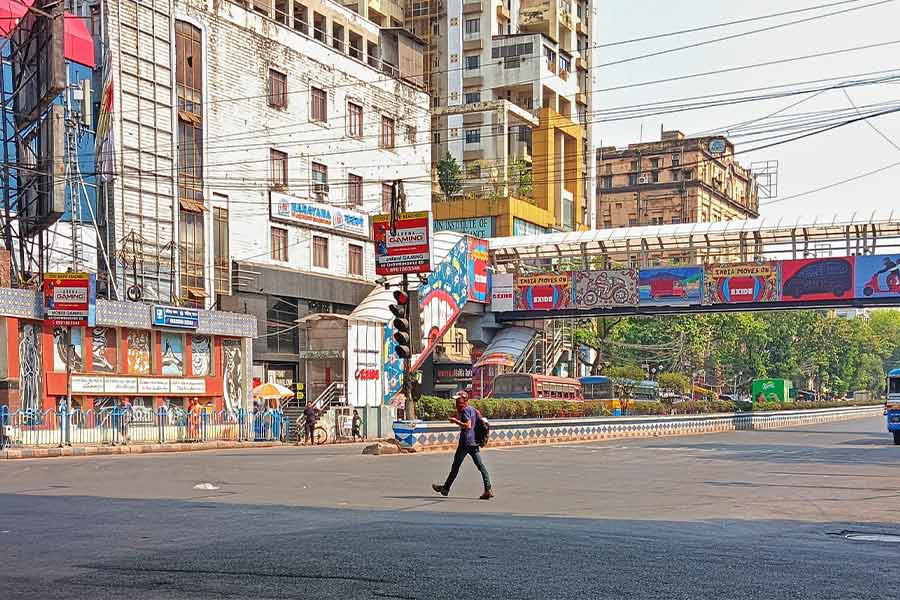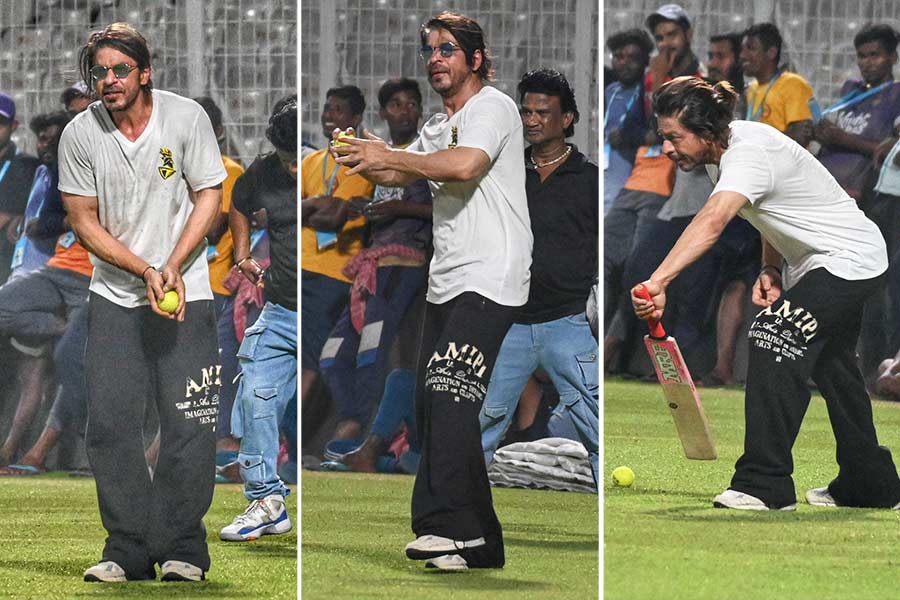Sanjay Agarwal came to Kolkata when was 19, in the hopes of reviving his academic career and landing a job. A little more than four decades later, Agarwal, now 62, is one of Kolkata’s most accomplished entrepreneurs, reaping the rewards for believing in himself and in the city he never wants to leave.
As co-founder and MD of CenturyPly, Agarwal has not only overseen the transformation of his company over the last three decades, but also been witness to Kolkata’s entrepreneurial ambitions, its potential and pitfalls. My Kolkata caught up with Agarwal at CenturyPly’s sprawling headquarters in Taratala to get his take on how this has evolved as a city of business, his vision for education in Bengal, upcoming goals for CenturyPly and more. Edited excerpts from the conversation follow.
My Kolkata: As a college student in Guwahati, you initially took up medicine. What made you change tracks to furniture thereafter?
Sanjay Agarwal: Unlike today’s youngsters, I didn’t have a lot of clarity about what I wanted to do. Back then, law, medicine and engineering seemed like the only viable options. I was a science student and got good marks in biology. So, I enrolled at Assam Medical College, taking up medicine. But after a year, I realised it wasn’t for me. While it was hard to quit and look for something else, I had to do it. In Assam, I wasn’t allowed to shift to commerce since I had a science background. Which is what brought me to Kolkata. After finishing my degree in commerce, I started a small unit of my own, where I was manufacturing doors. That’s where my journey with furniture began.
‘The people of Kolkata made me stay’
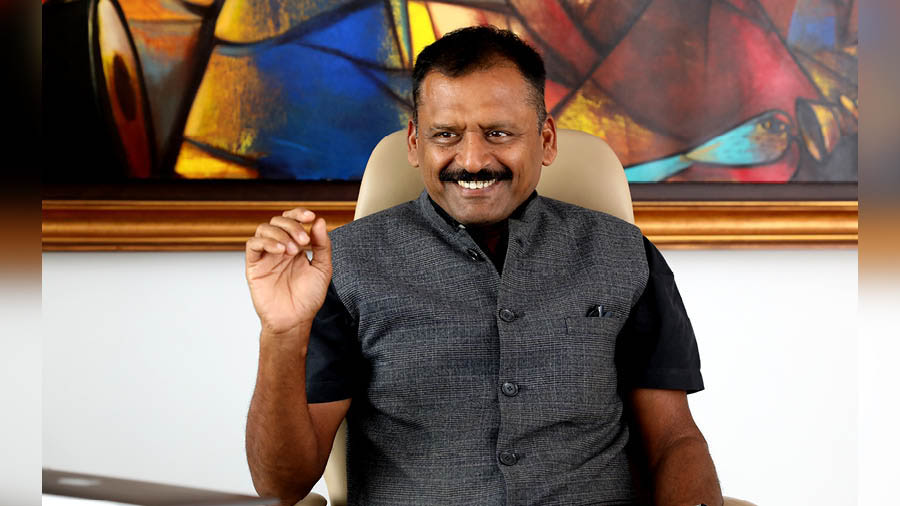
When he first came to Kolkata, Agarwal found a warmth in the city that had eluded him in India’s other metropolises
Arijit SenA lot of aspiring and emerging entrepreneurs, especially those in your industry, left Kolkata for greener pastures in the 1970s and ’80s. What made you stay?
I think it was the people of the city who made me stay. I remember my father giving me some money when I was in my early 20s, which I used to travel around the country. I went to all the big cities, and as a youngster, I must say I liked Mumbai better than Kolkata. But whenever I went to the likes of Mumbai, Delhi and Chennai, they seemed too big. As someone who comes from a small town where everyone knew everyone, those big cities didn’t connect with me. But Kolkata did. Somehow Kolkata still felt like a town, a place where people still had warmth. Not everything felt transactional in Kolkata, and its people seemed to care about human values. Even if I couldn’t articulate these things back in the day, they shaped my decision to stay back in Kolkata.
There was also something else. At the time I was starting off in business, Kolkata was notorious for its unionism and penchant for strikes. For me, it felt like a very tough environment to do business in. A lot of entrepreneurs were leaving, as you said, including Aditya Birla. That’s when I met Sushil Jhunjhunwala (presently Managing Director at LaOpala) and he asked me if I knew how many labourers Kolkata’s jute factories employed. I said, “Yes, around 10,000”. Then, he replied: “If they can do business in Kolkata, why can’t you?”
Even today, people ask me if or when I’ll leave Kolkata. The answer is I won’t. I love my life here and I’m not going anywhere, even if my children move out someday.

Agarwal feels Kolkata’s culture allows one to appreciate life better as compared to Delhi and Mumbai
UnsplashWhat are your favourite things to do/places to visit in Kolkata?
I love Kolkata’s club culture, it’s comfortable, luxurious and not very costly. Then there are all these restaurants that I have a great deal of fondness for, from Bar-B-Q to Paradise to Amber. The pace of Kolkata is such that it allows you to take everything in, to appreciate your surroundings. It’s a lot like running a marathon. Living in Delhi or Mumbai is like running sprints, you don’t have time for anything else. I prefer marathons, which is why I prefer Kolkata.
‘Tomorrow, either you will live or I’ were his exact words
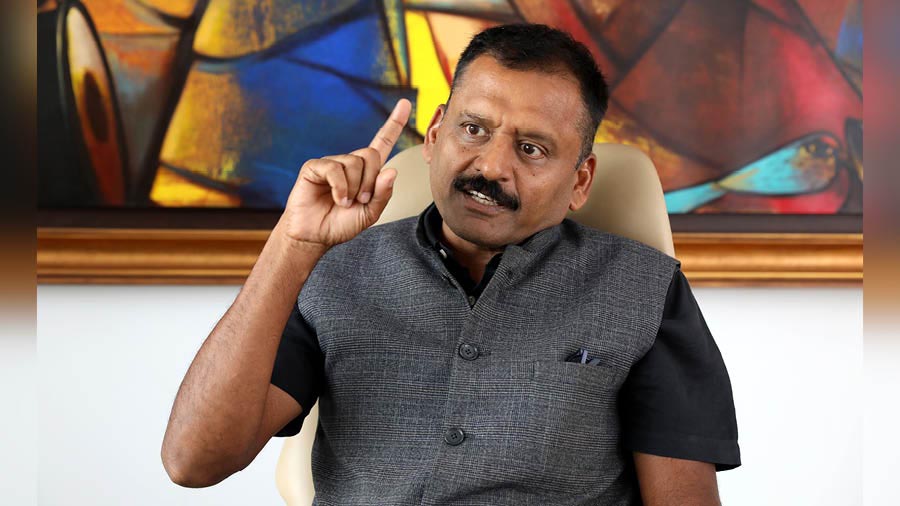
From government hoops to death threats, Agarwal has tackled a variety of challenges as an entrepreneur
Arijit SenWhat were the biggest challenges when you (alongside Sajjan Bhajanka) started CenturyPly? And what are the biggest challenges now?
At the time, navigating the government’s hoops was the hardest. Even if you purchased land, it wouldn’t get cleared by the government, and banks wouldn’t sanction your loans. Every small bureaucratic issue would take ages, making it virtually impossible to get big projects through. On top of that, there were the gundas! I remember this person in Thakurpukur who had threatened me that I had to do all my land deals through him, apart from paying him a hefty amount of chanda every year during Durga Puja. One day, he even issued a death threat: “Tomorrow, either you will live or I” were his exact words. He had dared me to turn up at the Thakurpukur bus stand at eight in the morning. I obliged, got out of my car, and waited for him at the assigned time and place. But he didn’t show up. He was standing at the other end of the bus stop and didn’t have the guts to come meet me. Since then, nobody has threatened me in the city!
If I talk about the challenges of today, they’re very different. Raising money isn’t difficult, anybody can do that. Just look at what the startups are doing! Didi (chief minister Mamata Banerjee) has helped a lot and government secretaries are very helpful. But the challenge today is that the markets have gone away from Bengal. Which is why we have to market across India. There is also a severe shortage of raw materials in the state, without which industry is always going to struggle.
Top line of Rs 10,000 crore for 2030
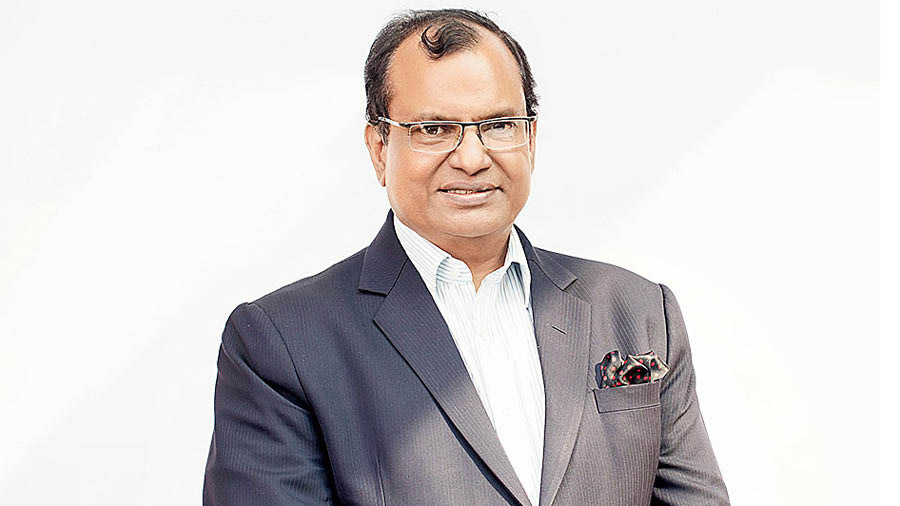
Agarwal describes Sajjan Bhajanka as his mentor and inspiration
TT ArchivesSajjan Bhajanka (chairman, CenturyPly) and you form one of the more successful jugalbandis of business in Bengal. Tell us about your equation.
Mr Bhajanka is my mentor, and I’m grateful to God for having him as my business partner. My life wouldn’t have been complete without him. Be it in business, philanthropy or personal life, I’ve always learnt a lot from him. He’s even more self-made than I am. At least I came from a family that had some financial foundation. But he started his career with a debt of Rs 30,000, back in those days. He is and will always remain an inspiration.
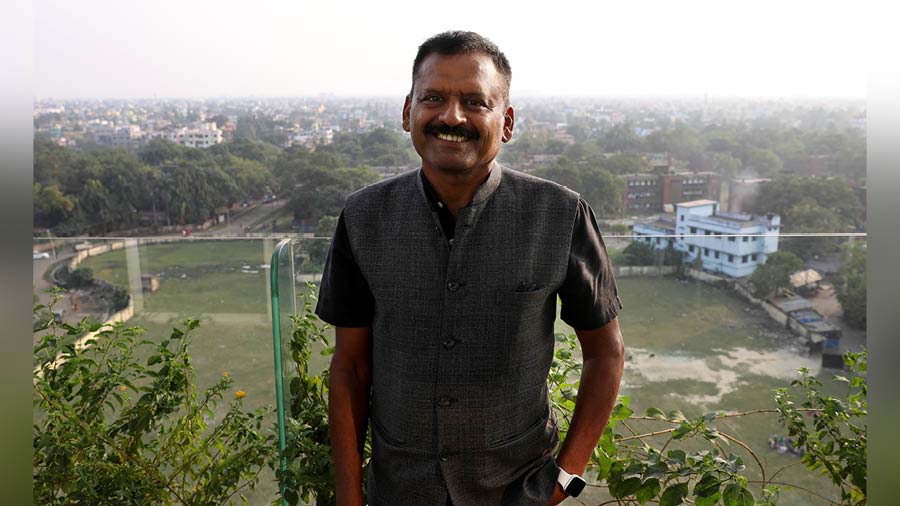
Agarwal believes that the next generation of CenturyPly should be the one shaping the company’s future goals
Arijit SenWhat is your vision for CenturyPly going forward? Any specific goals or objectives that you would like to share?
Earlier, I used to have very clear goals. I remember setting a target to reach Rs 1 crore turnover, which gradually went up to Rs 10 crore. Then, it was about marketing in India outside West Bengal. Nowadays, I don’t pay much attention to market caps, but if I have to quantify a goal, it'll be a top line of Rs 10,000 crore for 2030. Having said that, the most important goal for myself and Mr Bhajanka at CenturyPly has already been achieved. We wanted to get the next generation — in the form of Keshav (son of Sajjan Bhajanka) and Nikita (daughter of Sanjay Agarwal) — up and running and that’s already happened. They work harder than us and get more involved in the functioning of the company. Whatever goals CenturyPly sets next will be up to them.
‘By politicising education and institutions, Bengal lost its edge in education’
Let’s switch to some of your other pursuits now. As a patron of education, you are the Trustee of Heritage School and Heritage Engineering College besides being the vice-chairman of Heritage College. What do you see as the role of education for the next generation?
I believe that Indians are among the smartest, most hard-working and well-meaning people in the world. And yet, we don’t achieve anywhere near what we should. How do we change that? The answer is education. For a country to be great, education has to be great. If we educate ourselves, we’ll find a way to earn and help others also. For a case in point, just look at Kerala. You’ll struggle to find beggars in that state. The way I see it, Bengal used to be the hub of education in India, but politics took it away. By politicising education and institutions, Bengal lost its edge in education. I want to help bring back that edge. Money may come and go from the state, but education, once harnessed, tends to stay. Especially when it comes to educating the girl child.
You also happen to be a fitness freak and have participated in several marathons, including the Oxfam Trailwalker (which involves completing 100km in 48 hours). Tell us about your fitness regime. How do you find the time to maintain it?
Running and gymming are regular activities for me, with special training for treks — such as climbing 80 or 100 floors at a time — whenever the opportunity arises. Recently, I’ve also started doing more stretching. As for how I get the time, I think you make time for things in life you care about. Moreover, I’m at a stage in my career when I have no qualms in admitting that my health and personal life take precedence over my business. No individual is too busy to overlook their priorities. For me, fitness is among my top priorities and I have no dearth of time for it.
‘Star Cement became a household name after the largest Durga campaign’
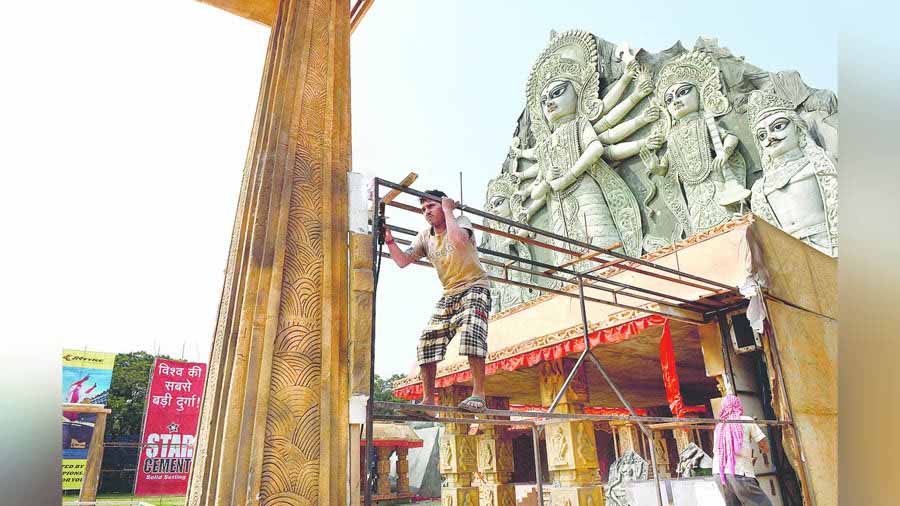
The world’s largest Durga idol, a Star Cement idea for Deshapriya Park in 2015
TT ArchivesHow do you look back on Star Cement’s largest Durga idol campaign at Deshapriya Park in 2015? In hindsight, would you have done anything differently?
For us, it was a branding exercise, which produced phenomenal results. After that, Star Cement became a household name in Kolkata and most parts of Bengal, to the extent that we stopped putting up hoardings.
Should some similar opportunity come up, I’ll have to consider branding, budgeting and what excites the local people to put a fresh spin on things.
As a movie buff who donned the hat of producer for Shantilal o Projapoti Rohoshyo (2019), how was that experience and do you wish to return to Tollywood anytime soon?
My experience was quite good. And I hope to return to producing more films in the future.
Integrity, investment and focus
Lastly, what would be your top three suggestions to emerging business leaders?
Champion integrity, and respect the value of your word. If you say you’ll deliver the goods by 6pm, you have to do it by 6pm. Or else tell your customer that you can’t. So many young people these days want to move fast and take shortcuts. Which means they don’t end up valuing integrity. Even if you’re giving bribes — and it happens everywhere, from India to Europe to the US — do it with integrity. Be transparent and own up to your actions.
The next thing I’d say is invest in what you care about. The more you invest, the more you’ll reap. Jo hoga dekha jayega isn’t an attitude that works in business.
Finally, you must have absolute focus. Remember how in school, we’d be taught to set fire to paper by focusing with our magnifying glass? Business is similar. If you have the right focus, you’ll set off the right sparks.


